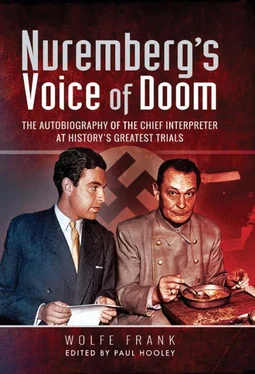11. ENGLAND
AS I SETTLED DOWN IN MY SEAT ON THE TRAIN I felt extremely hungry once again. The train was due in at Tidworth at 12.50 hours and Sykes would, I knew, lunch at 13.00. I had visions of steaming dishes. At Tidworth I jumped out of the train and almost ran to their house at 4 Hampshire Cross.
Humphrey Sykes received me joyfully. He was dressed in white. ‘I’m glad you got here in time,’ he said ‘I’m just off to play Cricket at Winchester College. You’ll be interested in seeing that, I’m sure’.
The maid passed us with the lunch dishes. Vainly, I tried to put across the fact that I was very hungry. I failed. We went off to Winchester. I have hated Cricket ever since, and I am sure that even today they talk about the silent guest at Winchester College who, during the tea break of a certain match, ate more sandwiches than the two opposing teams between them.
At the match I found myself sitting next to a teacher who wanted to practice his German. For some time, I gazed at a group of men who, at first, seemed to be in doubt about what to do with themselves. They finally started to throw a ball about half-heartedly and now and then one of them seemed to arouse himself from his lethargy, to take an awkward swing at the ball with a large, clumsy lump of timber. Finally, I felt that I required an explanation. I turned to my neighbour and asked him when they would start to play? ‘Heavens’ he said with an expression of complete horror on his face, ‘what do you mean? They’ve been playing for over an hour… and this is a frightfully exciting match!’
Back in Tidworth that evening, I managed to convey to the Sykes the essential details of what had happened to me, and my marriage. They felt that I must try to get Maditta over to England as quickly as possible. However, I had learned in Switzerland that her passport had been taken away.
Humphrey knew Lord Mount Temple, the Chairman of the Anglo-German Fellowship – that is how it came to pass that he and I visited his Lordship’s home at Romsey the following morning where the conversation concerning the return of my wife’s passport, which I reported in the Prologue of this book, took place.
Soon afterwards, I managed to sell the Graham Page and I settled down to polish up my English by reading mostly murder stories and going into lengthy sessions with Allan, Humphrey’s batman, who taught me the kind of English that cannot be found in any dictionary. This was quite essential. For instance, he taught me to say, ‘Chase a bug around a tree,’ quickly. He then assured me I was doing fine ‘why,’ he said, ‘you’ve nearly lost your accent’.
Travelling back from London by train soon afterwards, I encountered some officers’ wives from Tidworth. They admired my perfect English, but I submitted that I still had a lot to learn. However, it didn’t seem to me that saying, ‘chase a bug around a tree’ quickly was a necessary step in the right direction. Clearly, the ladies could not see it either and the conversation ceased abruptly. That night after dinner I tackled Humphrey’s uncle, Sir Sidney Barton, former British Ambassador in Addis Ababa. ‘Ahem; never mind that sort of nonsense,’ said Sir Sidney, ‘that won’t further your studies’.
Allan, the batman, was more constructive: ‘Sir,’ he said, ‘there’s a lot to this here English language that you won’t never pick up in there,’ and he pointed at the house, ‘but you’ll use it sooner or later. I reckon I’d better give you some lessons.’ When, two years later, I joined His Majesty’s Forces, I was therefore an equal in any barrack room conversation.
Soon after these events a German officer, Major Monzel, visited the 9th Lancers – Humphrey’s regiment – in an exchange that had seen one of the 9th’s officers go to Germany. I was asked if I would help Monzel a bit as he didn’t speak a word of English. Only too happy to meet someone who was worse off than myself, I set out for the officer’s mess.
Major Monzel was expecting me. ‘Heil Hitler,’ he-said. ‘ Falsch (wrong),’ I replied, ‘I’m not that sort of a German’. The Major looked over his right shoulder, then his left. Nobody was listening. ‘I’m sorry’ he announced, ‘neither am I, but you know what it’s like – I have to keep my job in the German Army’.
I looked him over. He was wearing a dark blue suit of uncertain vintage. It was a little tight; something which would improve after a few weeks of British Army food. The sleeves and trousers were on the short side. Later I discovered that he had also brought a bowler hat, 1923 model, and an umbrella, as he had heard that officers in England wore civilian clothes a great deal of the time.
After a few weeks I encountered Major Mozel on his solitary evening stroll. He was glad to see me. He had seen a number of interesting and puzzling things. But what puzzled him most was the attitude of these English officers towards soldiering. ‘They aren’t taking it seriously at all,’ he confided, ‘they never do any work but play all the time. Good God, to them, polo or cricket or hunting is more important than duty. That’s where the German Army is different, we’re all experts’.
Another month later he called on me with the request that I should write a farewell speech for him. He would be leaving in a couple of days and wanted to thank his hosts for their kindness. Speeches, I explained weren’t customary in England on such occasions. He wanted to make one just the same. So, I agreed to draft it. He had something on his mind and I managed to extract it. He felt that he had been wrong in his judgement of British Officers.
‘Perhaps these Englishmen are far wiser than I thought,’ he opined. ‘Yes, we in the German Army work more and harder. At the beginning I felt that the British would make a poor opponent in a war. Now, I’m beginning to wonder. We’ve worked so hard that we are tired. These men here are just playing at soldiering, but they enjoy it. Maybe, if war came they would have the great advantage of being fresh and enthusiastic while we would be “ pfichtgetreu ” – faithful to our duty – and tired.’
I told him that I hoped that he was right. I wanted to see Hitler defeated. He said nothing to that but stood there a minute and then left, reminding me to write his speech. He never got it. Someone saw it after I had concocted it and accused me of the most cold-blooded brutality for wanting to expose Major Monzel to much ridicule before British officers. Monzel would certainly have made a fool of himself if he had read it, not more so, though, than when he had Heil-Hitlered me amongst the lovely hills of Hampshire.
As for his hosts, the 9th Lancers, he may well have come across them again. They were part of that ill-fated British Expeditionary Force which ended up on the beaches of Dunkirk. He may even have met them again later, in Africa. They made quite a comeback when the German Army was beginning to ‘feel very tired.’

12. LEARNING THE ROPES
THOSE DAYS AT TIDWORTH, when I seemed between lives, were also days of emotional stocktaking. I knew where I had been, but I did not know where I was going.
My stormy transfer from an artificially carefree life in the very troubled world of Nazi Germany to the serene atmosphere of a British cavalry garrison headquarters seemed to me to have been like a lucky jump, without a parachute, from an aeroplane which was about to crash not knowing what might happen on impact.
What I felt was by no means regret over leaving the land from which most of my forefathers had not in any case come, but sorrow over the end of my marriage, or my life, with Maditta.
Читать дальше













